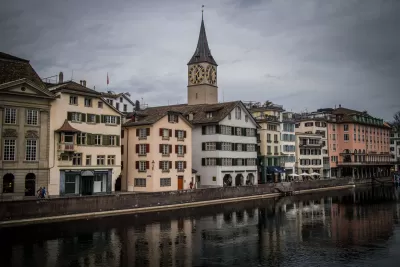Why is it that smallish cities in western Europe always score so well? Perhaps the underlying assumptions behind ostensibly data-driven "livability" rankings cater to a certain audience and leave most of us out.

Basing his critique on a recent livability ranking from Monocle, Feargus O'Sullivan argues that the way many media outlets approach "livability" among cities is highly suspect. "All are no doubt largely prosperous, high-functioning places," he writes. "But an overall feeling emerges from this cluster of familiar entries. These rankings provide less a universal assessment of livability—a word that comes with its own baggage—and more a snapshot of their compilers' tastes and worldview."
Zurich, for instance, which topped Monocle's list, "is a still-stratified society where high wages compensate for a degree of social stagnation, with migrants and Swiss from the wrong backgrounds enjoying good benefits and excellent tram links on the way to low-skilled jobs."
O'Sullivan also points to "a curious anti-urban slant" across many livability assessments that favorably pits cities of a few hundred thousand against megacities like Beijing or Bangkok. He writes, "it's hard not to wonder why these rankings tend to tap wealthy, smaller cities when larger, less wealthy ones may be making more radical, transformative improvements in life quality."
Though data-driven rankings may seem dispassionate, they still operate upon unstated assumptions. "They assess, broadly, how much potential a city possesses when seen from a privileged point of view: that of a straight, affluent, mobile, and probably white couple who works in something akin to upper management and has children. Remove even one of those characteristics from the equation and the results often seem way off the mark."
FULL STORY: Death to Livability!

Study: Maui’s Plan to Convert Vacation Rentals to Long-Term Housing Could Cause Nearly $1 Billion Economic Loss
The plan would reduce visitor accommodation by 25,% resulting in 1,900 jobs lost.

North Texas Transit Leaders Tout Benefits of TOD for Growing Region
At a summit focused on transit-oriented development, policymakers discussed how North Texas’ expanded light rail system can serve as a tool for economic growth.

Using Old Oil and Gas Wells for Green Energy Storage
Penn State researchers have found that repurposing abandoned oil and gas wells for geothermal-assisted compressed-air energy storage can boost efficiency, reduce environmental risks, and support clean energy and job transitions.

Private Donations Propel Early Restoration of Palisades Playground
Los Angeles has secured over $1.3 million in private funding to restore the Pacific Palisades playground months ahead of schedule, creating a modern, accessible space that supports community healing after recent wildfires.

From Blight to Benefit: Early Results From California’s Equitable Cleanup Program
The Equitable Community Revitalization Grant (ECRG) program is reshaping brownfield redevelopment by prioritizing projects in low-income and environmental justice communities, emphasizing equity, transparency, and community benefits.

Planting Relief: Tackling Las Vegas Heat One Tree at a Time
Nevada Plants, a Las Vegas-based nonprofit, is combating the city’s extreme urban heat by giving away trees to residents in underserved neighborhoods, promoting shade, sustainability, and community health.
Urban Design for Planners 1: Software Tools
This six-course series explores essential urban design concepts using open source software and equips planners with the tools they need to participate fully in the urban design process.
Planning for Universal Design
Learn the tools for implementing Universal Design in planning regulations.
Ascent Environmental
Borough of Carlisle
Institute for Housing and Urban Development Studies (IHS)
City of Grandview
Harvard GSD Executive Education
Toledo-Lucas County Plan Commissions
Salt Lake City
NYU Wagner Graduate School of Public Service





























